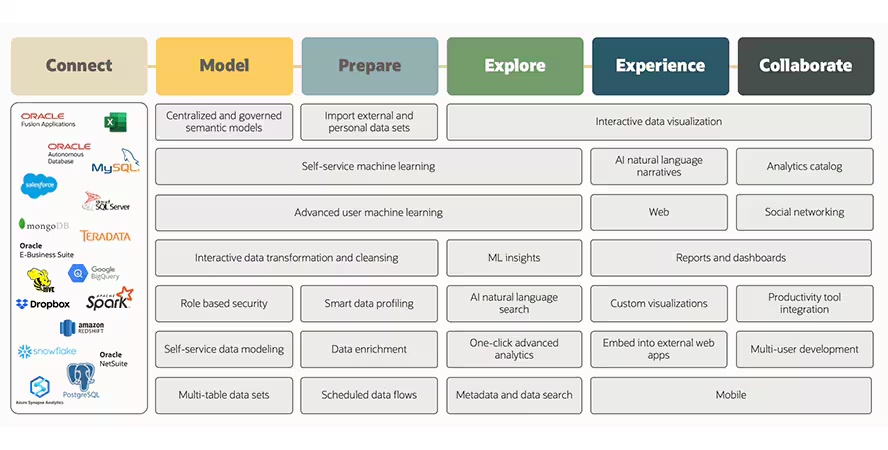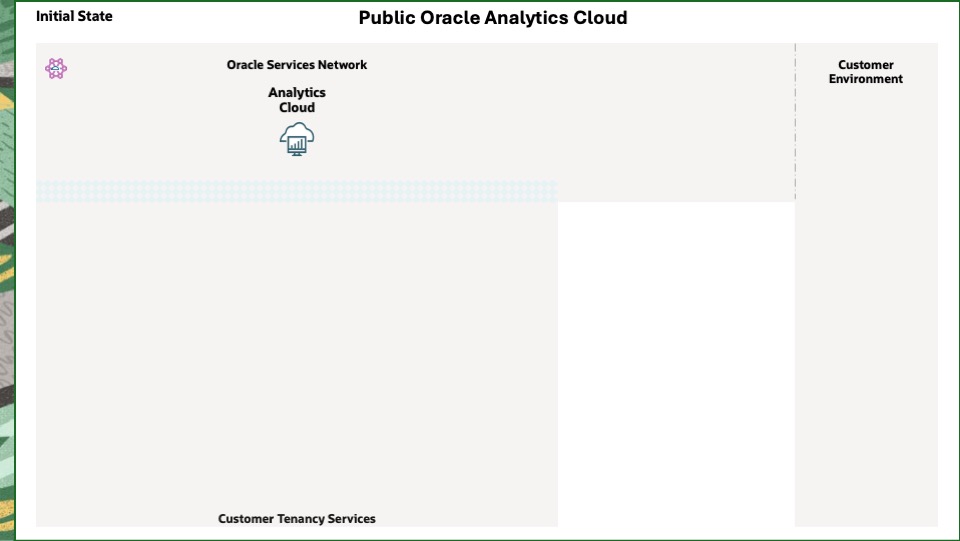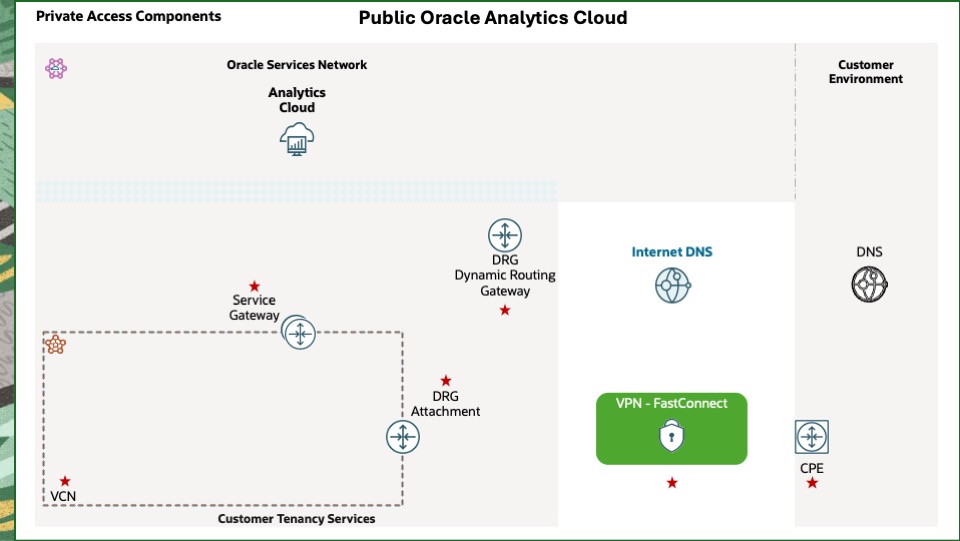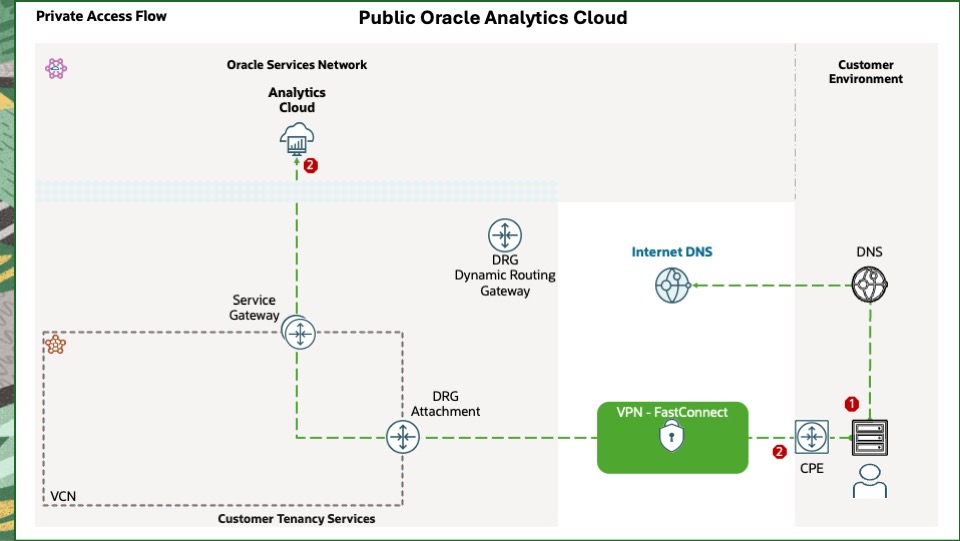
Published October 31, 2024.
The Oracle Analytics platform comprises OAC (Oracle Analytics Cloud) and OAS (Oracle Analytics Server). It supports the efforts of every analytics user role. AI and ML are embedded throughout the platform to accelerate productivity and power better business decisions. Features include:
- Data visualization and storytelling
- Machine learning
- Mobile analytics
- Open data source connectivity
- Data preparation and enrichment
- Enterprise data modeling

This post guides you in privately accessing public Oracle Analytics services using FastConnect, VPN, and other private channels.
It includes architectural diagrams, component descriptions, deployment scenarios, and links to other references.
Note: This post also applys to the FDI (Fusion Data Intelligence) platform.
SynopsisPublic services in the Oracle Services Network, such as OAC, can be accessed privately via VPN tunnels, FastConnect channels, and Remote Peering Connections. Network traffic never traverses the internet. This is accomplished by attaching on-premises and remote cloud network devices to a DRG (Dynamic Routing Gateway) that is attached to a VCN (Virtual Cloud Network) in OCI (Oracle Cloud Infrastructure). The DRG then forwards network traffic through the VCN’s Service Gateway to the appropriate service.
PrerequisitesFollowing the guidance in this post requires:
- An existing OCI tenancy.
- An existing public instance of Oracle Analytics Cloud.
- An OCI Administrator with the authority to manage networks in the tenancy.
Topics


This diagram depicts a public OAC instance in an OCI region in a customer’s cloud account (tenancy).
Prepared States

This diagram depicts the OCI network components required for private access.

The prepared architecture has these components:
- CPE (Customer Premises Equipment)
- DRG
- VCN
- DRG Attachment
- Service Gateway
The component details vary greatly depending on whether a VPN, FastConnect or an RPC (Remote Peering Connection) is used.
Whatever is used attaches to the DRG.
DRG
A DRG acts as a virtual router, providing a private path for traffic between a VCN (Virtual Cloud Network) and on-premises networks, third-party clouds, and remote VCNs.
VCN
VCNs are virtual, private networks created in an OCI region and compartment. They resemble traditional networks, with firewall rules, route tables, and gateways. VCNs contain one or more CIDR block ranges of IP addresses.
A DRG attachment explicitly attaches a DRG to a VCN.
Service Gateway
A regional service gateway allows a VCN to access supported Oracle Analytics services in the same region as the VCN.

Several frameworks exist to deploy the components.
The OCI Terraform provider allows you to use Terraform to interact with OCI resources.
OCI Console
The OCI Console provides a single interface to manage all cloud services.
OCI API (Application Programming Interface)
The OCI APIs are REST APIs that use HTTPS requests and responses.
OCI CLI (Command Line Interface)
The OCI CLI is a small footprint tool that can be used alone or with the OCI Console to complete OCI tasks. The CLI provides the same core functionality as the Console, plus additional commands. Some of these, such as the ability to run scripts, extend Console functionality.
A typical provisioning sequence illustration follows.
- Use an existing or obtain a supported device that can attach to a DRG.
- Use an existing or create a regional DRG.
- Use an existing or create a VCN.
- Use an existing or create a DRG attachment between the DRG and VCN.
- Use an existing or create a Service Gateway in the VCN.


This diagram depicts the flow from a browser to a public OAC instance without traversing the internet.
 The Internet DNS can be used to resolve the public OAC hostname and return the public IP to the browser.
The Internet DNS can be used to resolve the public OAC hostname and return the public IP to the browser.
 The customer equipment recognizes the IP, and routes the traffic to the DRG attachment and
The customer equipment recognizes the IP, and routes the traffic to the DRG attachment and
routes it through the service gateway to OAC.

Explore more about Oracle Analytics by visiting the community, blogs, and library.
Explore Analytics Platform Features
Data visualization and storytelling
Machine learning
Mobile analytics
Open data source connectivity
Data preparation and enrichment
Enterprise data modeling

